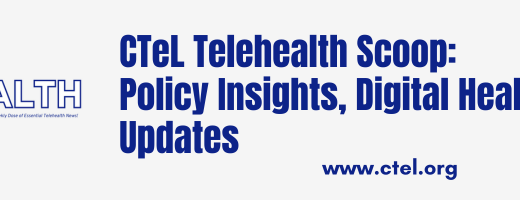Happy Friday, Digital Health Trailblazers!
The policy world was buzzing this week with a triple-shot espresso of AI ambition, budget battles, and some very notable code talk. Let's dive into the details you need to know, CTeL style!
Industry Intel: Codes, AI, and Global Moves
CPT Panel to Telehealth Codes: 'You Shall Not Pass... Away!' We can all exhale! The CPT Editorial Panel actions are out, and in a win for telehealth stability, they rejected a request to delete a series of new telemedicine service codes (98000-98015). However, don't get too excited—they also said "no" to creating new codes for remote continuous temperature monitoring and new RTM codes for oncology. One step forward, two steps... sideways?
APA to AI Devs: 'Protect the Teens!' The American Psychological Association is urging AI developers to build in features that protect the mental health of teens and young adults. A timely and crucial call to make sure our tech is helping, not harming.
Hims & Hers Goes Global: In a power move to expand its international footprint, Hims & Hers Health announced it's acquiring the European telehealth brand Zava.
Stanford Unleashes 'ChatEHR': Tired of digging through patient charts? Stanford's School of Medicine has launched "ChatEHR," AI software that lets clinicians ask questions of medical records directly. The future of chart review is here, and it's conversational.
Admin Action: All AI, All the Time (and Budget Cuts, Too!)
It was a busy week for the Administration, with AI taking center stage... right next to the budget axe.
Déjà Vu All Over Again: The Trump Administration's FY26 Budget Request officially dropped, once again calling for over $30 billion in cuts to HHS and a major agency reorganization. Congress holds the purse strings, but the Administration's priorities are crystal clear.
NIH Dreams of 'Fully Autonomous' AI Beings: In a Request for Information that sounds like it's straight out of a sci-fi novel, NIH is asking for public comment to help shape its AI strategy. The goal? Chart a path from today's analytics to "fully autonomous, self-documenting biomedical AI beings." Ready for a fully autonomous AI doctor?
FDA Deploys AI 'Elsa'… But Will It Let Go (of Mistakes)? The FDA has launched its own internal generative AI tool, affectionately named "Elsa," to help employees work more efficiently. However, there are whispers that the "bot is at best an advanced search engine — and prone to mistakes," a claim the agency denies. Let's hope Elsa's bugs are frozen out soon. Maybe Olaf can help.
HHS Gets a New Health IT Quarterback: Dr. Thomas Keane has been appointed as the Assistant Secretary for Technology Policy/National Coordinator for Health Information Technology. As a physician, engineer, and HHS veteran, he'll be leading the charge on our national health IT policy.
CMS Gets Tech-Savvy: The agency is going all-in on technology. In a closed-door meeting, CMS committed to building a national provider directory, creating a new identity verification system, expanding the Data at the Point of Care pilot, and joining the trusted data exchange. The goals? Use AI for fraud detection and to provide "personalized medical advice for beneficiaries."
Medicaid Work Requirements vs. The Humble Text Message: In a classic policy pickle, new Medicaid work requirements are making it harder for people to keep their coverage. The proposed solution? A push to exempt managed care plans from a 1991 law so they can text members to help them navigate the red tape.
Congressional Corner: Big Bills and AI Bills
The Bill Comes Due: CBO Scores the 'One Big Beautiful Bill Act': The non-partisan Congressional Budget Office estimates the House's reconciliation bill would increase the number of people without health insurance by nearly 11 million by 2034. When combined with other policies like expiring tax credits, that number could swell to 16 million.
SUPPORT Act Sails Through the House: In a positive step, the SUPPORT Act Reauthorization passed the House and is on its way to the Senate. This bill is critical for reauthorizing programs to combat the opioid crisis.
Meanwhile on the Hill: It's an AI Hearing Palooza! House committees were abuzz about AI, with hearings on the federal government's role in the AI age and the future of digital assets.
State Snapshot: Oregon Empowers Nurses
Go, Oregon, Go! Governor Tina Kotek signed HB 2789 into law, which will allow registered nurses to directly bill Medicaid for care management services starting in 2026. This is a significant move to empower nurses and expand access to care management in the state!
That’s the download for this week! Stay tuned, stay informed, and remember that in the world of digital health policy, there’s never a dull moment.
Have a great weekend, The CTeL Team













Share this post